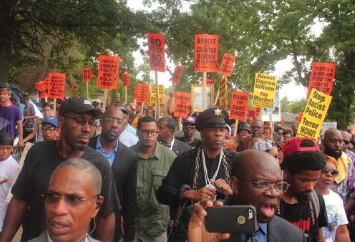Money woes could lead to dissolution, Ferguson leaders say
By AP | Last updated: Jan 15, 2020 - 5:41:24 AMWhat's your opinion on this article?
ST. LOUIS—The Missouri town thrust into the spotlight after the fatal police shooting of Michael Brown could face eventual dissolution unless serious financial threats can be resolved, Ferguson’s acting city manager told a federal judge Jan. 8.
Interim City Manager Jeffrey Blume offered that dire assessment during a hearing on how Ferguson is doing implementing police and court reforms mandated in a 2016 consent agreement with the U.S. Department of Justice. The agreement’s monitor, Natasha Tidwell, told U.S. District Judge Catherine Perry that recent efforts by the city, including hiring a full-time consent decree coordinator, “have propelled progress.”

Activist Anthony Shahid (center with hat) at 2014 National March on Ferguson.
|
That progress comes with a cost. Mr. Blume said Ferguson spent $1.1 million in the first three years of the consent agreement and expects to spend another $1 million over the next three years—a significant investment for a city with an annual budget of less than $13 million.
Equally concerning, Mr. Blume said, are two other issues whose costs threaten Ferguson’s existence: The 2020 Census, which could cost the city hundreds of thousands of dollars if it shows a drop in population; and two class-action lawsuits that could potentially cost millions of dollars.
Mr. Blume said Ferguson needs to “run the table” in avoiding big financial losses on all three issues “or we need to seriously consider dissolution.”
Ferguson became a focal point of the national Black Lives Matter movement after Mike Brown, a Black and unarmed 18-year-old, was fatally shot by White police officer Darren Wilson during a street confrontation on Aug. 9, 2014.
Mr. Wilson was not charged after a St. Louis County grand jury, and separately the Justice Department, cleared him of wrongdoing. He resigned in November 2014.
Still, the shooting led to months of often violent protests. It also prompted a Justice Department investigation that raised serious concerns about whether police targeted and harassed Blacks, and about how the municipal court generated millions of dollars in revenue through court fines and fees.
City leaders acknowledged that progress on the consent agreement has been slower than ideal, in part because of significant turnover in key positions such as police chief, city manager and court leadership. Mayor James Knowles III told Judge Perry that the city has done its best to balance everyday operation with the need to keep moving forward on the agreement.
After the hearing, Mayor Knowles said the cost of the agreement has forced Ferguson to cut back in nearly every area other than policing. He said dissolution should eventually be on the table if the city can’t afford even basic services like snow removal, pothole repair and maintaining parks.
“When you get to that level, you have to ask: Why exist?” Mayor Knowles said.
Mr. Blume said after the hearing that Ferguson leaders are prepared to pay $1 million to implement the consent agreement over the next three years. The problem would be if it proves more costly or goes on longer than expected, he said.
The Census is concerning because Ferguson’s population is declining. The town had about 29,000 residents in the mid-1970s, and now has about 21,000. Mr. Blume said that if the 2020 Census shows a five percent population loss, Ferguson would lose nearly $400,000 in federal money. City leaders plan a strong outreach program to ensure that every resident is counted.
The two class-action lawsuits, both citing the same issues raised by the consent agreement, could cost the city more than $10 million if Ferguson loses. Mr. Blume said the city’s insurance would not cover the loss.
It will be “a couple of years” before city leaders know if they’ve survived the financial challenges, Mr. Blume said.
Ms. Tidwell gave Ferguson generally high marks for its recent efforts on the consent agreement, including implementing a program forgiving thousands of people for court fines and costs. She said Ferguson is still “lagging behind” in developing a plan for the police department to become more engaged with the community.
Several residents at the hearing raised concerns about the transparency of the city’s efforts. Many cited the city’s clunky website as hard to navigate and lacking in details.
“It’s been really difficult for us to stay engaged and stay informed,” resident Felicia Pulliam said. (AP)
INSIDE STORIES AND REVIEWS
-
-
About Harriett ... and the Negro Hollywood Road Show
By Rabiah Muhammad, Guest Columnist » Full Story -
Skepticism greets Jay-Z, NFL talk of inspiring change
By Bryan 18X Crawford and Richard B. Muhammad The Final Call Newspaper @TheFinalCall » Full Story -
The painful problem of Black girls and suicide
By Charlene Muhammad -National Correspondent- » Full Story -
Exploitation of Innocence - Report: Perceptions, policies hurting Black girls
By Charlene Muhammad -National Correspondent- » Full Story -
Big Ballin: Big ideas fuel a father’s Big Baller Brand and brash business sense
By Bryan Crawford -Contributing Writer- » Full Story






 Click Here Stay Connected!
Click Here Stay Connected!








